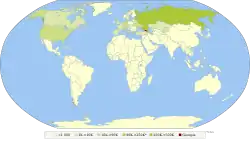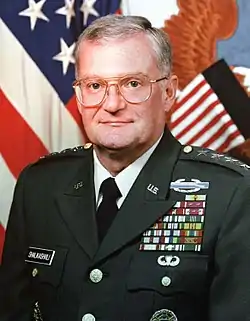Georgian diaspora
The Georgian diaspora refers to both historical and present emigration from Georgia. The countries with the largest Georgian communities outside Georgia are Turkey and Russia.

Distribution of the Georgian origin migrants as of 2017
Geographic distribution
| Country/territory | Ethnic Georgians (latest official) |
Ethnic Georgians (low est.) |
Ethnic Georgians (high est.) |
People born in Georgia (of any ethnicity) |
Citizens of Georgia |
|---|---|---|---|---|---|
| 157,803 (2010 census)[1] | 600,000[2] | 1,000,000[2] | 436,442 (2010)[3] | ||
| 43,526 (2016)[4] | |||||
| 43,272 (2017)[5] | 13,334 (2017)[6] | ||||
| 34,200 (2001 census)[7] | 71,015 (2001)[8] | ||||
| 18,000 (2017)[5] | 24,055 (2017)[6] | ||||
| 19,784 (2016)[6] | |||||
| 17,522 (2014)[5] | 9,767 (2017)[6] | ||||
| 14,585 (2017)[5] | 14,603 (2017)[6] | ||||
| 10,612 (2017)[5] | 11,078 (2017)[6] | ||||
| 11,837 (2014)[5] | 10,170 (2014)[6] | ||||
| 9,900 (2009 census)[10] | |||||
| 4,990 (2009 census)[11] | |||||
| 4,775 (2016 census)[12] | 2,570 (2016)[13] | ||||
| 3,966 (2015 census)[14] | |||||
| 2,400 (2009 census)[15] | |||||
| 1,129 (2011 census)[16] | 1,289 (2017)[5] | ||||
| 617 (2011 census)[17] | 49,322 (2011)[18] | ||||
| 501 (2004 census)[19] | |||||
| 372 (2011 census)[20] | |||||
| 3,635 (2017)[5] | 3,406 (2017)[6] | ||||
| 1,340 (2012)[5] | |||||
| 2,187 (2013)[21] |
|||||
| 1,437 (2017)[5] | |||||
| 935 (2017)[5] | |||||
| 910 (2017)[5] | |||||
| 746 (2016)[5] | 429 (2016)[6] | ||||
| 670 (2017)[5] | |||||
| 530 (2017)[5] | 2,120 (2017)[6] | ||||
| 325 (2017)[5] | |||||
| 302 (2017)[5] | |||||
| 229 (2017)[5] | |||||
| 98 (2017)[5] | |||||
| 91 (2017)[5] | |||||
| 85 (2017)[5] | |||||
| 35 (2017)[5] | |||||
| 25 (2017)[5] | |||||
| 436 (2003)[5] | 138 (2010)[6] | ||||
| 60 (2014)[5] | |||||
| 45 (2016)[5] | |||||
| 15 (2015 census)[22] | |||||
Notable people of Georgian descent

John Shalikashvili, a United States Army General who served as Chairman of the Joint Chiefs of Staff and Supreme Allied Commander from 1993 to 1997.
- André Andersen, a Russia-born Danish multi-instrumentalist and composer.
- David Bagration of Mukhrani, a claimant to the headship of the Royal House of Georgia and to the historical thrones of Georgia.i
- Jorge de Bagration, a Spanish racing car driver of Georgian descent and a claimant to the headship of the Royal House of Georgia and to the historical throne of Georgia.
- George Balanchine, one of the 20th century's most famous choreographers.
- Paata Tsikurishvili, Founding Artistic Director & CEO of highly acclaimed Synetic Theater in Washington DC metropolitan USA 2001 - present. synetictheater.org
- Irina Tsikurishvili, Founding Choreographer of Synetic Theater. Most celebrated choreographer in DMV region.
- David Baramidze, a Georgian-born German chess Grandmaster.
- Elena Botchorichvili, a writer
- David Chavchavadze, an American author and a former Central Intelligence Agency (CIA) officer of Georgian-Russian origin.
- Maryam d'Abo, an English film and television actress.
- Lasha Darbaidze, a Georgian-born American citizen who holds the positions of Honorary Consul of Georgia and President of the St. George Foundation.
- Anna Dogonadze, a Georgian-born German athlete.
- Vernon Duke, an American composer and songwriter.
- Wachtang Djobadze, a Georgian art historian who lived in the United States as an émigré.
- Andrew Eristoff, a Republican Party politician from New York City who serves as New Jersey State Treasurer under Governor Chris Christie.
- Georgiy Gongadze, a Ukrainian journalist of Georgian origin who was kidnapped and murdered in 2000.
- Alex Greenwich, the member of the New South Wales Legislative Assembly seat of Sydney.
- Michael Gregor, an aircraft engineer of Georgian origin.
- Elly Heuss-Knapp, a German liberal politician and author.
- Tzipi Hotovely, an Israeli politician and member of the Knesset for the Likud party.
- Darren Huckerby, an English former professional footballer and academy coach.
- Alexander Kartveli, an influential aircraft engineer and a pioneer of American aviation history.
- María Katzarava, Mexican opera soprano of Georgian descent.
- David Koma, a Georgian born London based fashion designer.
- Vitaliy Kononov, a candidate in the 2004 Ukrainian presidential election, nominated by the Green Party of Ukraine.
- Kola Kwariani, a Georgian-American professional wrestler and chess player.
- Giorgi Latso, a Georgian-American classical pianist and composer.
- Georges V. Matchabelli, a Georgian nobleman and diplomat, who emigrated to the United States after the 1921 Soviet invasion of Georgia.
- Katie Melua, a Georgian-born British singer, songwriter and musician.
- George Papashvily, a Georgian-American writer and sculptor.
- Irina Shabayeva, the winner of the sixth season of Project Runway along with her model, Kalyn Hemphill.
- John Shalikashvili, a United States Army General who served as Chairman of the Joint Chiefs of Staff and Supreme Allied Commander from 1993 to 1997.
- Joseph Stalin (born Ioseb Besarionis dzе Jughashvili), the de facto leader of the Soviet Union from the mid-1920s until his death in 1953.
- Tamta, a Greek pop singer famous in Greece and Cyprus.
- Omari Tetradze, a former football player of Georgian Greek descent who, during his playing career, represented Russia at international level.
- Jerzy Tumaniszwili, a Polish naval commander of a Georgian aristocratic descent.
Destinations
Europe
- Georgians in Belarus
- Georgians in Belgium
- Georgians in Cyprus
- Georgians in Denmark
- Georgians in Estonia
- Georgians in France
- Georgians in Germany
- Georgians in Greece
- Georgians in Italy
- Georgians in Latvia
- Georgians in Lithuania
- Georgians in Moldova
- Georgians in the Netherlands
- Georgians in Norway
- Georgian emigration in Poland
- Georgians in Russia
- Georgians in Spain
- Georgians in Ukraine
- Georgians in the United Kingdom
- The World Congress of the Nations of Georgia
North America
See also
- List of Georgians
- History of Georgia
References
- Notes
- Abkhazia is the subject of a territorial dispute between the Republic of Abkhazia and Georgia. The Republic of Abkhazia unilaterally declared independence on 23 July 1992, but Georgia continues to claim it as part of its own sovereign territory and designates it as a territory occupied by Russia. Abkhazia has received formal recognition as an independent state from 7 out of 193 United Nations member states, 1 of which has subsequently withdrawn its recognition.
- Excluding Artsakh. The Republic of Artsakh (Nagorno-Karabakh) is a de facto independent state that is generally not considered part of the Armenian diaspora. It is internationally recognized as de jure part of Azerbaijan. According to the 2005 census, the number of Armenians in NKR is 137,380.[9]
- South Ossetia's status is disputed. It considers itself to be an independent state, but this is recognised by only a few other countries. The Georgian government and most of the world's other states consider South Ossetia de jure a part of Georgia's territory.
- Citations
- "Национальный состав населения Российской Федерации [National makeup of the population of the Russian Federation]" (PDF) (in Russian). Russian Federal State Statistics Service. Archived from the original on 2019-08-15. Retrieved 2019-08-29.CS1 maint: bot: original URL status unknown (link)()
- Chachanidze, Nodar (13 February 2014). ""Over a million Georgians reside in Russia."". factcheck.ge. FactCheck.ge. Archived from the original on 24 August 2020.
For instance, Badri Kutelia, a Georgian sociologist currently living Russia, wrote that: “The number of Georgians living in Russia is somewhere between 600 thousand and 800 thousand.” Mikheil Khubutia, President of the Georgian Union in the Russian Federation, asserts that the official figures estimate the number of Georgians living in Russia atone million.
- "Всероссийская перепись населения 2010 г. Население Российской Федерации и ее субъектов по месту рождения". demoscope.ru (in Russian). Archived from the original on 17 August 2019.
- "2015 год - Национальный состав наличного населения на 1 января 2016 года". ugsra.org (in Russian). Office of State Statistics of the Republic of Abkhazia. Archived from the original on 25 August 2019.
- "Stock of foreign-born population by country of birth: Georgia". stats.oecd.org. 25 August 2019. Archived from the original on 25 August 2019.
- "Stock of foreign population by nationality: Georgia". stats.oecd.org. 25 August 2019. Archived from the original on 25 August 2019.
- "National composition of population". ukrcensus.gov.ua. Archived from the original on 15 August 2019.
- "Распределение населения по месту рождения". 2001.ukrcensus.gov.ua (in Russian). State Statistics Committee of Ukraine. Archived from the original on 19 August 2019.
- National Statistical Service of Artsakh. "De Jure Population (Urban, Rural) by Age and Ethnicity" (PDF). Archived from the original (PDF) on 5 March 2009. Retrieved 5 January 2013.
- Ethnic composition of Azerbaijan 2009. Retrieved 7 July 2012.
- "Қазақстан Республикасындағы ұлттық құрам, діни наным және тілдерді меңгеру". stat.gov.kz (in Kazakh). Ministry of National Economy of the Republic of Kazakhstan Statistics committee. p. 4. Archived from the original on 13 September 2015. Retrieved 13 September 2015.
- "Ethnic Origin, both sexes, age (total), Canada, 2016 Census". Statistics Canada. Archived from the original on 12 August 2019.
- "Immigrant population by place of birth, period of immigration, 2016 counts, both sexes, age (total), Canada, 2016 Census". Statistics Canada. Archived from the original on 13 August 2019.
- Kulumbegov, R. (29 December 2016). "Южная Осетия в цифрах и фактах (вышел сборник «Итоги переписи населения Республики Южная Осетия 2015 года»)". respublikarso.org (in Russian). Archived from the original on 25 August 2019.
В стране проживает 48146 осетин, 610 русских, 3 966 грузин, 378 армян.
- "Ethnic Composition of the Population of the Republic of Belarus". National Statistical Committee of the Republic of Belarus. Archived from the original on 29 July 2013. Retrieved 27 January 2013.
- "TSG11-06. Resident population on March 1, 2011 by ethnicity, sex and age group". csb.gov.lv. Central Statistical Bureau of Latvia: Sākumlapa. Archived from the original on 15 August 2019.
- "Population (urban, rural) by Ethnicity, Sex and Age" (PDF). Population Census 2011. Statistical Committee of the Republic of Armenia. Archived from the original (PDF) on 17 August 2019.
- "Population by Place of Birth, Sex and Age" (PDF). Population Census 2011. logoStatistical Committee of the Republic of Armenia. Archived from the original (PDF) on 17 August 2019.
- "Eighth and ninth periodic reports of the Republic of Moldovaon the implementation of the International Convention on the Elimination of All Forms of Racial Discrimination". geneva.mfa.gov.md. Ministry of Foreign Affairs and European Integration of Moldova. 7 July 2010. p. 5. Archived from the original on 17 August 2019. Retrieved 27 December 2019.
The membership of small ethnic minorities living in various places across thenational territory is as follows: • Georgians − 501
- "1 lentelė. Gyventojai pagal tautybę 1959, 1970, 1979, 1989, 2001 ir 2011 metais" (PDF). osp.stat.gov.lt (in Lithuanian). Statistics Lithuania. p. 7. Archived from the original (PDF) on 15 August 2019.
- "Nationality and country of birth by age, sex and qualifications Jan - Dec 2013 (Excel sheet 60Kb)". Office for National Statistics. Retrieved 11 June 2014.
- "Աղյուսակ 5.4 Բնակչությունը (քաղաքային, գյուղական) ըստ ազգության, սեռի և կրոնական դավանանքի [Table 5.4: Population (urban, rural) by ethnicity, gender and religious affiliation]" (PDF). stat-nkr.am. Artsakh Republic National Statistical Service. Archived from the original (PDF) on 2019-04-03.
This article is issued from Wikipedia. The text is licensed under Creative Commons - Attribution - Sharealike. Additional terms may apply for the media files.
